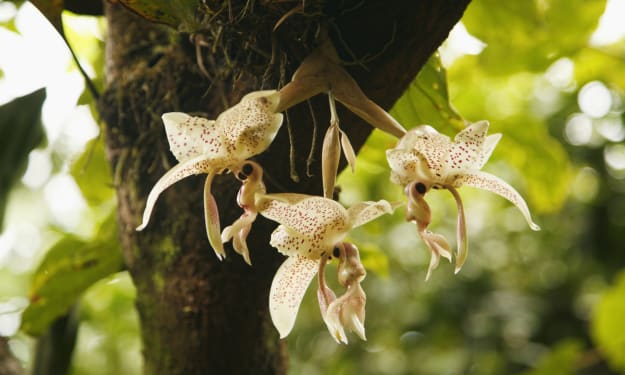After the Apocalypse (2)
The Indonesian Archipelago: 1885
“Ah, Cahya, I wouldn’t have tripped if you hadn’t talked to me just then, I looked back at you and didn’t see the root.” As they returned to the Crone’s stall, they kept up a banter around mouthfuls of fruit. Normally, the village’s loosely organized gang of bully-children would have swooped on such a chance to mock the clumsy ‘Rock-Boy’ and harass his sister ‘The Ghost’ but they had already scattered to their various roosts for the day and were unavailable to play the vultures to Cahya and Gemi’s ‘carrion’.
“Doesn’t One-Eye keep account of her fruit?” Gemi asked Cahya.
“I don’t know. What can she do even if she knows some are missing?” whispered Cahya back, they were near the Crone now and wished to avoid agitating her. The one-eyed stupid lady was a friend of the Crone’s.
The Crone smiled down at Gemi in her tooth-challenged manner as she handed him one of the lockboxes in which she stored her merchandise at night. “Hold this please, Tuan, while I fill it with the ribbons. You are strong enough now to hold up a box of ribbons I hope. I have a treat for you tonight; I bought some pes from Dilap!” Gemi was delighted and deeply surprised. The Crone did try to feed the children to the best of her ability, but as a long-time infrequent eater herself, growing into a nascent senility, she often forgot. The children thought of this as indifference. That she had recalled Gemi’s lust for the sticky, thick coconut paste from Lombok was a surprise. That she had bought him some of the expensive stuff to put on his bread was a mild but delightful shock!
“Thank you, grandmother!” he managed to blurt out.
“You are welcome. Little Tuan,” the old woman smiled down at him. Though Cahya couldn’t stomach the stuff, the Crone loved it almost as much as Gemi and she would help him deal with the rich concoction. It would also give her energy for tomorrow’s travels.
Cahya watched this exchange while she efficiently bundled up the stall, securing the front shutters with timbers from some long-forgotten shipwreck. Once again, she pondered over what motive had encouraged this wizened old woman to accept them; so much smaller, so much skinnier and fragile, frightened and still in shock. They were two ragged coastal town children from far away, cast ashore in the market town by the merchant crew who had found them adrift. What did she see in them that Cahya and Gemi couldn’t see?
Without word and after long practice, they turned in the brief dusk to setting up their home for the night beneath the old sailcloth and making preparations for their simple meal. The Crone knew that it was the routine, the regularity of the activity, which had really rescued these two little drifters, these small ejecta from a nearby but distant catastrophe. Soon enough, gorged on the rich paste, they fell asleep.
The old lady left before dawn, working her way down toward the shore of the strait between Flores and Komodo in the company of several others of the village’s small merchants. She had squeezed a tiny living out of life this way for some forty years, ever since her young husband had disappeared at sea.
Cahya knew the routine of the market well. She had the shop set up long before any potential customers wandered by. As Gemi stepped into the stall from his morning visit to the river she reminded him, superfluously really, to keep a close eye on the gang of children of which they were themselves a sometimes-part, hanging around the market. “Kemuning will try to distract you again, Little Toad, don’t be fooled by her eyes this time.”
“I’m not fooled by her anything, Cahya. The last time it was the farting buffalo that made me look away for just a moment. I won’t let a stupid farting buffalo make me stop watching the goods this month!” Thievery was mostly a game around the Crone’s stall and only on the day she was away. The baubles and talismans, mostly Animistic, a few Islamic and a very few even Christian, which the old lady dealt in were of little value or use to the market urchins, they couldn’t easily be resold without the precious ribbons which marked the Crone’s specialty. The ribbons were held in a particular sealed box and only attached at time of sale- a kind of premium and receipt.
It was the food merchants like the one-eyed stupid lady who had the most to worry about from the local children; always hungry, always watching, but bullying the two Sumatran orphans was an amusing side-hobby for some of the gang. The Crone’s monthly business trips to the coast offered them a bright opportunity to harass Cahya and Gemi, getting away from ‘The Ghost’ and ‘Rock Boy’ with some ridiculous trinket was a topic for honorable bragging for at least a week after it was accomplished. The orphans were good at watching over the stall and both armed themselves with stout bamboo sticks with which to swat viciously at questing illicit fingers. As well, Cahya’s sort of friend Wein, who appeared to have some form of vested interest in her, also watched carefully from his usual position at the bird cages. Wein was wiry, fast and tall for his age. His light ‘Chinese’ skin tone made him the target of occasional bullying too, causing him to harbor even greater sympathy for Cahya and Gemi.
The morning rain ended, and the sun found its way through the banyan limbs, drying the musty, dank ground where it could reach. Marshanda, the littlest tormentor, stepped out from behind a passing cart and began to tastelessly mime a kind of wayang interpretation of various people being swept away by a great wave. As disgusted as he was, Gemi ignored her until Kemuning walked up to Marshanda shouting, “Imbecile!” pushing the little girl into a steaming puddle. In the moment Gemi blinked to laugh at the tumbler, Susswan; one of the bigger boys and Cahya’s true nemesis, snatched a particular icon from the stall which could be said to only have significance in its utter worthlessness, even to the old lady. The icon was a wooden ora figure in the bizarre shape of a cross, which had proved to be too Animist for the Christian customers and too Christian for the Animists. It was particularly unlovely and absolutely no one would buy it. It had languished on the second shelf for seven years as the Crone had no love, no regard whatsoever, for the ugly thing. But Susswan had pilfered it and Cahya was profoundly tired of Susswan’s brand of foolishness.
“Watch the stall, Gemi,” she ordered as she raced down the road after the gangly thief.
“It’s only that ugly ora-cross thing,” called back Gemi as the remaining children followed Cahya under a low-lying liana stretching across a gap between shacks under the massive old banyan. Aside from Gemi not a child was left in the market, the fun was in the chase.
Please continue reading this story in "After the Apocalypse" (3)
https://vocal.media/fiction/after-the-apocalypse-3
About the Creator
Roy Stevens
Just one bad apple can spoil a beautiful basket. The toxins seep throughout and...







Comments (1)
Hey! This is pretty captivating, Roy! I am really curious where we are going... Your characters in this are getting really interesting and somehow you even had me feeling bad for the "ugly ora-cross thing" haha